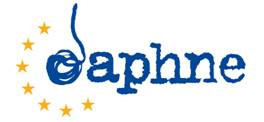Menu di sezione
- Home
- About the Hermes Project
- About the Daphne Programme
- About Partners
- About the Network
- About Workers
- The activities
- Hermes's Products
- Let's continue building networks
Contenuto della pagina

The Daphne Programme
The HERMES Project - Linking network to fight sexual and gender stigma" (Section "About Hermes Project") is funded by the European Union "Daphne III" Program, whose aim is to prevent and fight all forms of violence (physical, sexual and psychological), occurring in public or private domain, against children, young people and women. Specifically, "Daphne III" program (2007-2013), whose title is "Combating violence towards children, adolescents and women", forms part of the General Program "Fundamental Rights and Justice".
Its main purpose is therefore to protect violence and discrimination victims and groups considered at risk to attain a high level of physical and mental health protection, well-being and social cohesion. The program is addressed to target groups, such as families, teachers, social workers, police, medical staff, judicial staff, non-governmental organizations (NGOs) and public authorities.
In particular, Daphne III program aims to:
· assist and encourage NGOs and other organizations acting in combating violence;
· set up multidisciplinary networks aiming at strengthening cooperation between NGOs;
· develop and implement awareness-raising actions addressed to specific audiences;
· disseminate the results obtained within the two previous Daphne programs;
· ensure the exchange of information and good practices, for instance through study visits and staffs exchange;
· study phenomena related to violence and their impact on victims and society (health-care, social and economic costs);
· develop programs for the support of victims and people at risk and for the intervention on perpetrators.
In order to achieve these purposes, the program supports three types of action:
· Specific actions taken by the Commission: research, opinion polls and surveys, collection and dissemination of data, seminars, conferences and experts meetings, development and maintenance of websites, etc.;
· Transnational projects resulting reasonable by European Community and involving at least two Member States;
· Support to NGOs or other organizations pursuing an aim of general European interest.
Countries allowed to take part in these Program Actions are: a) countries that have signed an accession treaty with the European Union; b) candidate countries beneficiaries of a pre-accession strategy; c) EFTA States that have entered the SEE agreement; d) Western Balkan countries.
Participation is bonded to compliance with the conditions of the framework agreement.
Candidate countries not participating at the program may join these projects if this could be useful to their adherence preparation, the same may occur in the case of third countries not participating to the program if it is coherent with projects aims.
The beneficiaries of the funding must present technical and financial reports on the actions implementation and a final report by three months from the fulfilling of the action. Supervision and financial control will be also carried out.
The Commission will present to the Parliament and the Council an interim evaluation report on the implementation of the projects and their results (not later than 31 March 2011) and an ex-post evaluation report on the implementation and the results of the program (not later than 31 December 2014). In the meantime, it will present a communication on the folle-up of the program not later than 31 May 2012.